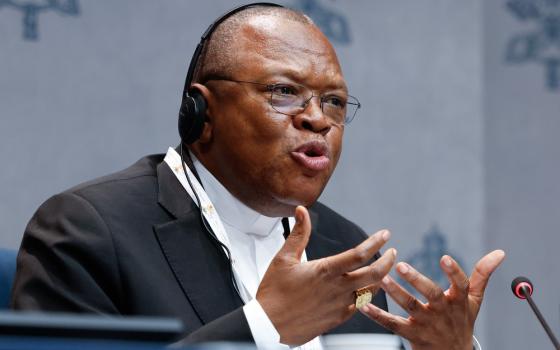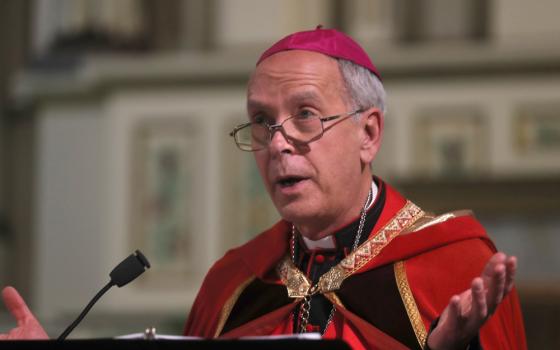A dozen women from around the world shared compelling and sometimes harrowing stories of their struggles for peace, education and equality during a Vatican event Tuesday, with some calling for better representation and women's leadership at the highest levels of the Catholic church.
The event, organized as an opportunity for women to share their voices from the center of the church bureaucracy on International Women's Day, was careful however to skirt the issue of women's governance in the Catholic community, choosing to speak instead of women's capabilities to share leadership.
In fact, one of the most prominent speakers at the third annual Voices of Faith event said that the focus of conversations about women's roles in the church around questions of ordination is "unfortunate" because it causes suspicion when any issue relating to women is raised in church circles.
Carolyn Woo, president and CEO of Catholic Relief Services, said that when women speak there is a lingering question: "Is this a slippery slope so that everything women want is eventually to the priesthood?"
"I think because so much of the conversation, particularly the dominant conversations and the loudest conversations, have focused on women's ordination -- which is off the table -- [that] whenever women plead, or speak, or recommend, or propose there's this skepticism or suspicion," said Woo. "Is this conversation leading to ordination?"
"I think that is unfortunate because along the way we fail to hear ... the voices of the mothers, of the single mothers, of the lay pastoral associates," she said.
Woo was one of a dozen women and several men taking part in Tuesday's event, put together as an opportunity for women to share their stories of faith on the yearly day focused on them.
Organized by the Liechtenstein-based charitable trust Fidel Götz Foundation, the event was web-streamed around the world from the Vatican's Casina Pio IV, an iconic marble building that is home to the Pontifical Academy of Sciences.
The CRS president was speaking as part of a panel discussion during the event that was described as a multigenerational conversation on expanding women's leadership in the church.
The comments made by the members of the panel were notably softer than those made during a similar panel at last year's Voices of Faith event, where several prominent speakers tackled issues such as women's ordination and using inclusive language in the church's liturgies.
While speakers at the panel this year spoke again of women's leadership in the church, the word ordination arose only once -- when Woo said the discussion around the topic was unfortunate.
The panel discussion was the conclusion of the four-hour event and was moderated by Jesuit Fr. Thomas Smolich, the international director of Jesuit Refugee Service. Other speakers on the panel included: Geralyn Sheehan, director of the U.S. Peace Corps in Colombia; Petra Dankova, a Czech living in the U.S.; and Nicole Perone, a master's student at Yale Divinity School.
Dankova, a postulant with the Sisters of the Holy Redeemer, started the discussion by saying she did not want to speak in a dualistic way.
"I think it's really dangerous that we would look at the church in this dualistic view of this men-dominated institution, to which women are somehow external," she said. "In my own experience as someone was has converted to the Catholic faith as an adult, I know that the church I converted to was a community."
Perone mentioned how women are now leading in society as heads of government and CEOs, saying that "women can succeed in any sphere" and asking: "Why is the church the last frontier on that?"
The Yale student particularly mentioned that the two Vatican offices most devoted to women -- the pontifical councils for laity and family life -- are not led by women.
"It baffles the mind why a non-lay person would be running the pontifical council for the laity," she said. "This is just logic."
Woo, who has led CRS since 2012, said that women today are knocking at the doors of the church.
"The generation of people that follows us ... they will stop knocking," she said. "There will come a day when there will be the silence of people not knocking. That the young women who follow us, they cannot imagine the life behind that door. They begin to not see that door at all."
"I think the great fear for me is that we're knocking right now, but a generation will come where they may not knock," she said. "And I think that's what the church faces."
Woo also called for an expansion of papal teaching toward women, noting that several recent pontiffs, including Pope Francis, have praised what they have called the "feminine genius."
"A lot of times that term is evoked to mean women's sensitivity ... women's ability to attend to others, to nourish and to care," she said. "But what about women as social critics or social activists like Dorothy Day?" she asked. "What about women who are scandalous like Dorothy Day and Mary Magdalene and the woman at the well?"
But the CRS president also said that she is "not totally comfortable that a lot of the conversation is about titles."
"Pope Francis has this sort of teaching against the lure and the temptation of clericalism," said Woo. "I don't think women should be going after that, which is the sense of privileged status."
Tuesday's event began with a sharing of stories from different women around the world. Topics ranged from trying to build peace during and after the Croatian War, to struggling against the dictatorial Marcos regime in the Philippines, to trying to overcome the practice of allowing for child brides in Kenya.
Cecilia Flores spoke of being a political prisoner under Marcos and to giving birth while in prison.
"This is a dream for me," said Flores. "To stand in the heart of the Vatican, to know the doors are opening."
"Freedom is a choice," she said. "A choice to do something ... a choice to make a difference. And I'm inviting you to be a part of it."
[Joshua J. McElwee is NCR Vatican correspondent. His email address is jmcelwee@ncronline.org. Follow him on Twitter: @joshjmac.]


